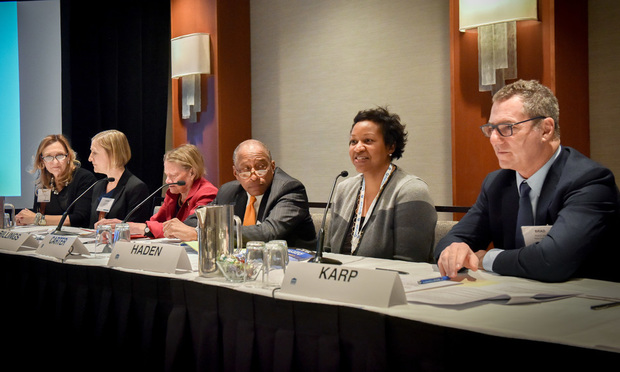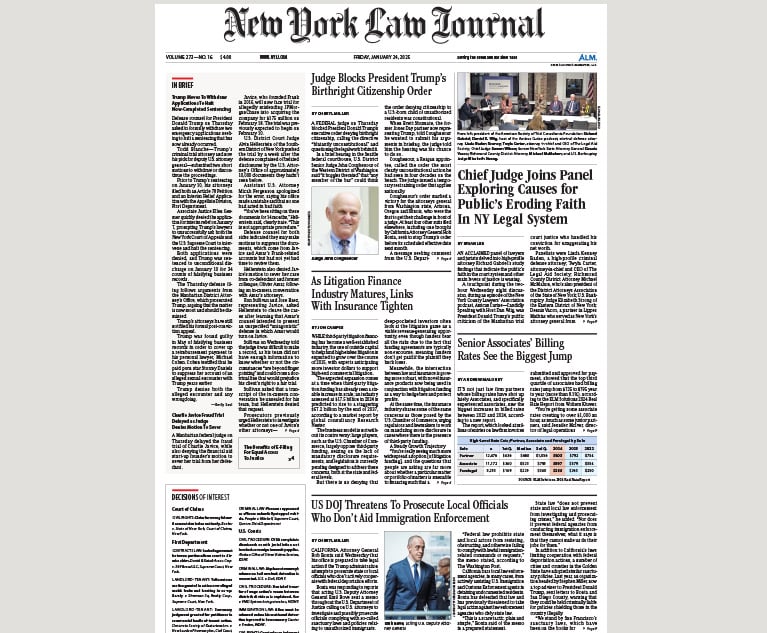From Paul Weiss and CBS to the Courts, Bar Panel Grapples With Diversity
Paul Weiss chairman Brad Karp said the firm took recent criticism as a chance to improve its approach to diversity, while several leading New York lawyers discussed strategies to advance women in the law.
January 15, 2019 at 05:43 PM
7 minute read
 From left: Terri Mazur, panel co-chair; Laura Sulem, director, Practical Law Litigation, Thomson Reuters; state Supreme Court Justice Lucy Billings; Zachary Carter, New York City corporation counsel; Laurie Robinson Haden, senior vice president and assistant general counsel of CBS Corp. and founder and CEO of Corporate Counsel Women of Color; and Brad Karp, chairman of Paul Weiss. (Photo: David Handschuh/NYLJ)
From left: Terri Mazur, panel co-chair; Laura Sulem, director, Practical Law Litigation, Thomson Reuters; state Supreme Court Justice Lucy Billings; Zachary Carter, New York City corporation counsel; Laurie Robinson Haden, senior vice president and assistant general counsel of CBS Corp. and founder and CEO of Corporate Counsel Women of Color; and Brad Karp, chairman of Paul Weiss. (Photo: David Handschuh/NYLJ)
The statistics are well known at this point. Women are only a fraction of equity partners of large law firms, and they make up a minority of the judiciary and corporate general counsel positions.
A panel of leading New York attorneys on Tuesday offered tips and strategies on how to turn the tide, taking a look at what's worked in their own firms, courtrooms, the government and corporations. Panel members included Manhattan Supreme Court Justice Lucy Billings; Brad Karp, chairman of Paul, Weiss, Rifkind, Wharton & Garrison LLP; Corporation Counsel Zachary Carter; and Laurie Robinson Haden, assistant general counsel at CBS Corp.
The strategies, discussed in a panel discussion at the New York State Bar Association's annual meeting in Manhattan, include recommendations for strong mentoring, accountability for both corporations and law firms in diversity goals, normalizing women leaders and empowering them.
For Paul Weiss, it's also learning how to improve after a crisis, said Karp. Despite what the firm calls a strong history in hiring and promoting diverse lawyers, it faced heavy criticism in December for its announcement of a new partner class dominated by white men.
“You have a crisis and you learn from it,” Karp said Tuesday, describing the firm's reaction to the criticism. “We have to get this right. We have to view this as an inflection point, where we can do something consistent with our values on diversity and inclusion going forward.”
He ticked off several steps the firm has taken, including modifying its compensation program. Already, partners each year write an eight-page memo about their accomplishments for the year. “We're now requiring a separate addendum on what did you do to promote diversity and inclusion,” Karp said. “That's going to be part of the compensation evaluation at the end of the year.”
Karp said the firm also is creating a diversity task force with partners and associates that he will chair, while the firm is putting in place “artificial intelligence solutions” to look for implicit or unconscious bias in the evaluation process. “We're trying really hard to think of every possible solution we can to make sure our classes are as close to 50/50 or better than 50/50 in terms of diversity,” Karp said.
Paul Weiss has held several partnership meetings and has held three associate town halls over the past four weeks, Karp said, where he said he explained how the new partner class came to be and talked about the importance of mentoring and training.
He offered his own recommendations for advancing women and diverse lawyers, including formal and informal mentoring. “In order to make partner at a big New York law firm, you need to have someone show you the ropes,” Karp said. “It's almost impossible to innately figure it out on your own.”
Karp said he has transitioned client relationships to senior women associates and young female partners who “run with it.” In a law firm, he said, “power is client relationships.”
Client Consequences
Robinson Haden, at CBS, said accountability is key in making sure both corporate law departments and law firm stick to their diversity goals. “We all hear these stories of corporations who send out these diversity surveys,” she said. “And then the firm may go through process of filling out the survey and nothing happens.”
CBS, she said, completes a “new matter form” to record who is working on its cases, allowing the company to track how many women and diverse lawyers are working on its matters, she said. The company then tracks the billing to see if a diverse set of lawyers are working substantively on the matters, she said.
“Once you have this data, you have to be prepared to take action,” including never hiring the firm again or a having a tough conversation, said Robinson Haden, a founder of the group Corporate Counsel Women of Color.
She listed other corporate accountability methods she has observed, including one major corporation that provided a bonus to law firms that have diverse lawyers working on its cases and another that required a relationship partner be a woman or person of color.
Courtroom Accountability
Despite some law firm and corporate goals for diversity, Justice Billings said she still hasn't seen that much progress in women taking a leading role in her courtroom.
“I can't tell you the number of times that I will see a table of mostly white men lined up in front of me, ready to try a case, and I will say 'Are there going to be any women participating in this trial? Don't you expect that the jury will be at least 50 percent women, at least 50 percent persons of color?'” she said. “So I really make a point of it.”
Billings said judges should encourage women's participation in the courtroom, such as arguing motions they wrote and examining witnesses at trial. When a female attorney does appear for a court appearance, Billings recommended to senior litigators in firms, “give her the authority to make the strategic decision. Give her settlement authority; don't make her have to interrupt the argument or the hearing to go check with you.”
“We have to call out interruptions and call out talking over women and men using women's contributions as their own,” she said.
Carter, of the city's Law Department, said the majority of the leadership in the office are women. “I think that's because, for me, diversity takes on a momentum of its own as a product of a lived experience. You can have all the seminars you want on the value of diversity, but there's nothing like actually living under female leadership to make it feel comfortable and normal,” said Carter, describing his experience working under Elizabeth Holtzman when she was Brooklyn district attorney.
Meanwhile, the city's Law Department has retained outside vendors with expertise in unconscious bias training. An acknowledgment of unconscious bias is not an accusation of bigotry, he said, but “just a realization that all of us grow up with a propensity to type and to stereotype.”
This content has been archived. It is available through our partners, LexisNexis® and Bloomberg Law.
To view this content, please continue to their sites.
Not a Lexis Subscriber?
Subscribe Now
Not a Bloomberg Law Subscriber?
Subscribe Now
NOT FOR REPRINT
© 2025 ALM Global, LLC, All Rights Reserved. Request academic re-use from www.copyright.com. All other uses, submit a request to [email protected]. For more information visit Asset & Logo Licensing.
You Might Like
View All
Paul Hastings, Recruiting From Davis Polk, Adds Capital Markets Attorney
3 minute read
Neighboring States Have Either Passed or Proposed Climate Superfund Laws—Is Pennsylvania Next?
7 minute readTrending Stories
- 1New York-Based Skadden Team Joins White & Case Group in Mexico City for Citigroup Demerger
- 2No Two Wildfires Alike: Lawyers Take Different Legal Strategies in California
- 3Poop-Themed Dog Toy OK as Parody, but Still Tarnished Jack Daniel’s Brand, Court Says
- 4Meet the New President of NY's Association of Trial Court Jurists
- 5Lawyers' Phones Are Ringing: What Should Employers Do If ICE Raids Their Business?
Who Got The Work
J. Brugh Lower of Gibbons has entered an appearance for industrial equipment supplier Devco Corporation in a pending trademark infringement lawsuit. The suit, accusing the defendant of selling knock-off Graco products, was filed Dec. 18 in New Jersey District Court by Rivkin Radler on behalf of Graco Inc. and Graco Minnesota. The case, assigned to U.S. District Judge Zahid N. Quraishi, is 3:24-cv-11294, Graco Inc. et al v. Devco Corporation.
Who Got The Work
Rebecca Maller-Stein and Kent A. Yalowitz of Arnold & Porter Kaye Scholer have entered their appearances for Hanaco Venture Capital and its executives, Lior Prosor and David Frankel, in a pending securities lawsuit. The action, filed on Dec. 24 in New York Southern District Court by Zell, Aron & Co. on behalf of Goldeneye Advisors, accuses the defendants of negligently and fraudulently managing the plaintiff's $1 million investment. The case, assigned to U.S. District Judge Vernon S. Broderick, is 1:24-cv-09918, Goldeneye Advisors, LLC v. Hanaco Venture Capital, Ltd. et al.
Who Got The Work
Attorneys from A&O Shearman has stepped in as defense counsel for Toronto-Dominion Bank and other defendants in a pending securities class action. The suit, filed Dec. 11 in New York Southern District Court by Bleichmar Fonti & Auld, accuses the defendants of concealing the bank's 'pervasive' deficiencies in regards to its compliance with the Bank Secrecy Act and the quality of its anti-money laundering controls. The case, assigned to U.S. District Judge Arun Subramanian, is 1:24-cv-09445, Gonzalez v. The Toronto-Dominion Bank et al.
Who Got The Work
Crown Castle International, a Pennsylvania company providing shared communications infrastructure, has turned to Luke D. Wolf of Gordon Rees Scully Mansukhani to fend off a pending breach-of-contract lawsuit. The court action, filed Nov. 25 in Michigan Eastern District Court by Hooper Hathaway PC on behalf of The Town Residences LLC, accuses Crown Castle of failing to transfer approximately $30,000 in utility payments from T-Mobile in breach of a roof-top lease and assignment agreement. The case, assigned to U.S. District Judge Susan K. Declercq, is 2:24-cv-13131, The Town Residences LLC v. T-Mobile US, Inc. et al.
Who Got The Work
Wilfred P. Coronato and Daniel M. Schwartz of McCarter & English have stepped in as defense counsel to Electrolux Home Products Inc. in a pending product liability lawsuit. The court action, filed Nov. 26 in New York Eastern District Court by Poulos Lopiccolo PC and Nagel Rice LLP on behalf of David Stern, alleges that the defendant's refrigerators’ drawers and shelving repeatedly break and fall apart within months after purchase. The case, assigned to U.S. District Judge Joan M. Azrack, is 2:24-cv-08204, Stern v. Electrolux Home Products, Inc.
Featured Firms
Law Offices of Gary Martin Hays & Associates, P.C.
(470) 294-1674
Law Offices of Mark E. Salomone
(857) 444-6468
Smith & Hassler
(713) 739-1250








